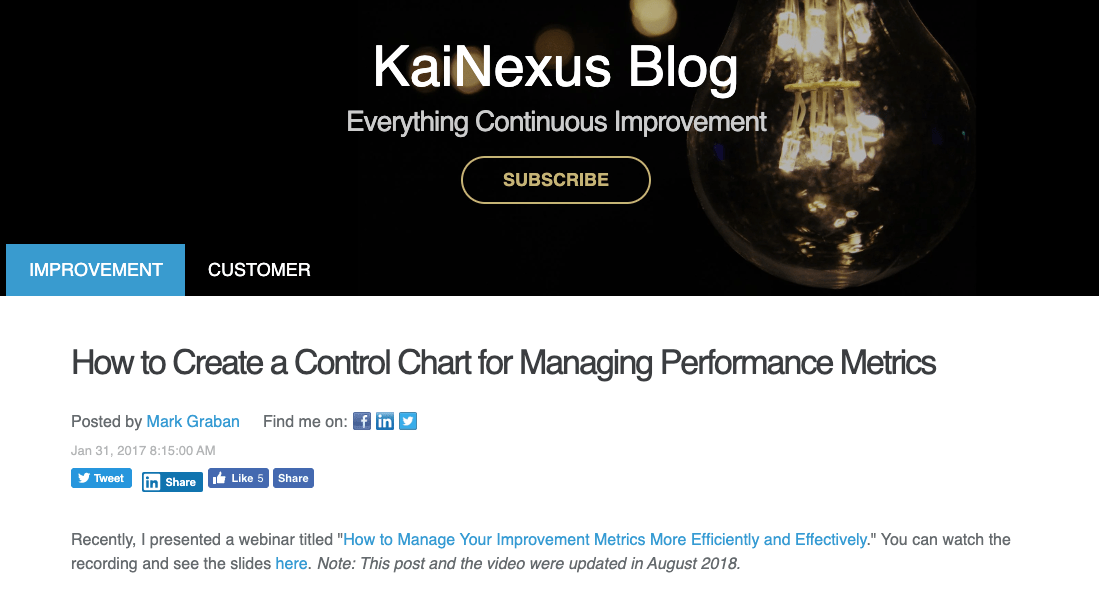As I've shared before, one of my goals with my book Measures of Success: React Less, Lead Better, Improve More was to reach audiences that haven't heard of “Process Behavior Charts” (aka Control Charts or Statistical Process Control).
In December, I had the opportunity to be interviewed by radio host Gordon Deal for one of his podcasts for small business (you can find it here via my blog).
Last month, I also had the opportunity to do a shorter interview for a bigger audience — on his national radio show, “This Morning, America's News with Gordon Deal.”
Anyway, here is the interview, with a transcript below.
Transcript:
Gordon Deal: When it comes to your career path, your family's financial future, or even a weight loss journey, how can focusing on little setbacks throw a monkey wrench into your overall progress? Analysis from Mark Graban, author of a book called “Measures of Success.” He's also a professional speaker and consultant.
Mark, what do you see here?
Mark Graban: One thing I see in a lot of different industries, and we do it as individuals, is this tendency to overreact to the most recent number that we see, whether that's a number, numbers on a blood pressure cuff, or a number on a report that's sent to us as management. The number is a little bit worse, and we tend to get upset. The number's a little bit better. We get too excited. [laughs]
There's this roller coaster of emotion that's really short-term focused. When we can step back, and instead of just comparing one data point to another, let's look at 18 months' worth of data. Let's plot it out visually. We can see if there are trends, or we can see, in a lot of cases, the number is just fluctuating around an average.
All of that overreaction to the up/down, trying to explain it, in a way ends up actually hampering the efforts that we should be making to not just explain the number but to improve the results.
Gordon: To your point there, where does this short-term focus come from? Is that today's got-to-have-it-now environment? Or what?
Mark: I don't know if it's even just today? It's funny.
The methods that I've learned and used, and I teach in my book, Measures of Success. The statistical methods behind the types of charts I like to use have been around for 70 years. One of the core books that I've learned from was published in the 1980s, so a lot of this, I don't think it's a recent phenomenon, but maybe that's accelerated.
Organizations talk about big data, and we can get lots and lots of reports, and a lot more information. That creates a temptation or a risk that we're just reacting more to that flood of information.
There's some methods. In particular, a method I really like, called “process behavior charts” that help us filter that flood of data, to kind of filter out the noise, the fluctuation, the up and down, and the metrics, so that we can identify the meaningful changes that we should react to. When we react to everything, we're really not reacting or prioritizing anything properly.

Gordon: These methods are what? What do you recommend?
Mark: I think for one, I go to a lot of organizations, let's say a hospital. They'll have posted on a bulletin board, literally, just a list of numbers. It's like you just printed out a spreadsheet. People are not wired to really detect trends from just seeing a list of numbers.
One thing simple enough is to use a spreadsheet and create a chart, and visualize that data so you can see is there actually a trend. Has it been fluctuating around an average? If so, can we do something to boost the average that it's fluctuating around?
Let me give you an example. An organization I've been working with is an outpatient surgery center. Every month, if the patient satisfaction number was up, they get excited. They might throw a pizza party. Then the number is down. They get upset and they ask people to explain it.
But we're working on some things that are meant to actually improve the system that's going to lead to higher patient satisfaction. We're going to use process behavior charts to help show that we've made a statistically significant improvement. We're not just declaring victory over the latest above-average data point.
Gordon: Thanks, Mark. Mark Graban — the book is called Measures of Success.
Please scroll down (or click) to post a comment. Connect with me on LinkedIn.
Let’s work together to build a culture of continuous improvement and psychological safety. If you're a leader looking to create lasting change—not just projects—I help organizations:
- Engage people at all levels in sustainable improvement
- Shift from fear of mistakes to learning from them
- Apply Lean thinking in practical, people-centered ways
Interested in coaching or a keynote talk? Let’s start a conversation.









![When Was the Last Time a Leader Around You Admitted They Were Wrong? [Poll]](https://www.leanblog.org/wp-content/uploads/2025/07/Lean-Blog-Post-Cover-Image-2025-07-01T212509.843-100x75.jpg)